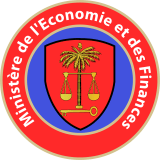
Ministry of Economy and Finance: The bet for modernity and growth
Creating the most conducive conditions for economic recovery and building a modern state capable of reducing poverty and improving economic growth, the challenge is daunting. But the current Haitian Government is its cardinal mission and is relentlessly pursuing the search for macroeconomic stabilization and improving the management of public finances, the two major priorities for achieving this.
The institution is under the responsibility of a Minister, assisted by a Secretary of State for Finance and a particular technical cabinet. She takes up neighborhood at # 5 Avenue Charles Sumner, Port-au-Prince. The Haitian Minister of Economy and Finance is among the Governors of the World Bank, the International Monetary Fund and the Inter-American Development Bank. The Board of Governors elects the presidents of each of these institutions.
The same institution, another name
Created by the decree of March 13, 1987, the Ministry of Economy and Finance has the fundamental mission to formulate and conduct the economic, financial and monetary policy of the Haitian state to promote growth and socio-economic development of the country on a sustainable basis. Clearly, it ensures the strategic management of the national economy. And, among other attributions, the MEF manages the treasury, the national budget as well as the state property.
Prior to this decree, the institution was called the Ministry of the Economy, Finance and Industry. And from Independence to the present day (2014), Haiti has known 175 Ministers of Economy and Finance. The first, André VERNET, exercised from January to October 1804 under the reign of Jean Jacques DESSALINES, Father of the Fatherland.
One institution, multiple entities and multiple partnerships
To fulfill its mission, the Ministry of Economy and Finance has structures organized into internal services, deconcentrated services and decentralized services or autonomous bodies under supervision.
Internal services assume the application, control and evaluation of the financial, monetary and fiscal policies of the Haitian State as well as the supervision of deconcentrated services and autonomous organizations. They include central departments and technical units whose coordinators have the rank of directors.
Decentralized services are the institutional extension of internal or central services. They deal respectively with the collection of taxes (DGI), customs revenue (AGD), preparation and execution of the national budget (DGB), audit and diagnosis of public institutions (IGF), studies and statistical research (IHSI).
Decentralized services or autonomous bodies are created and governed by laws. They serve as support for the development support policy included in the MEF's mission. For example, the FAES, the Monetization Office, the Border Development Fund and the Technical Implementation Units serve as an instrument to fight against poverty.
These autonomous organizations work to strengthen the economic capacities of the most disadvantaged communities. Communal sections, passing through the communes to the departments.
At the same time, the National Port Authority and SONAPI promote trade, investment and job creation by providing entrepreneurs with the services they need for their economic activities. The OAVCT guarantees insurance cover in case of road accident.
The ULCC, for its part, implements the Government's anti-corruption policy by promoting sound management practices within the Public Administration and by organizing training sessions for public service executives . Among its achievements, the Anti-Corruption Unit has a draft law on the Public Sector Employees' Heritage Declaration.
The MEF is present throughout the national territory. It has a Coordination Unit of Departmental Directorates, 9 departmental directorates and the District Office of Petit-Goâve. It also ensures a presence, as a member, in major international or regional organizations including CARICOM, the WTO, the World Bank, the UN to name a few.
The MEF represents the government in economic partnerships. It manages loan and grant agreements signed with partners in the international community.
Community-specific services
The MEF provides the community with information on the national economy in general. They can be found on its website www.mef.gouv.ht and in its regular publications such as the TOFE, the Economic Situation, the reports of studies of the Haitian Institute of Statistics and Computer Science etc. Other information also affects the administrative procedures for obtaining public services. The DGI Taxpayer's Guide, CPD publications and the DIF's publications on customs exemption are examples.
Through its National School of Financial Administration (ENAF), the MEF trains young people in public finances and employs them in the civil service. Students from the UEH and private universities benefit from documentary support to prepare their thesis.
The sites of modernization and economic growth
Since 2004, the Ministry of Economy and Finance has been undertaking an in-depth reform in the management of public finances. Listed in the long list of achievements: financial audits of several public companies, evaluation of the Haitian financial system, new system of public accounting, creation of a high authority (IGF) control of the financial system organizations, creation of the Corps of Financial Controllers and Public Accountants, setting up a new computerized public expenditure management system (SYSDEP).
The Ministry of Economy and Finance has as its fundamental mission to formulate and implement the economic and financial policy of the state. The Ministry of Economy and Finance exercises the following functions:

